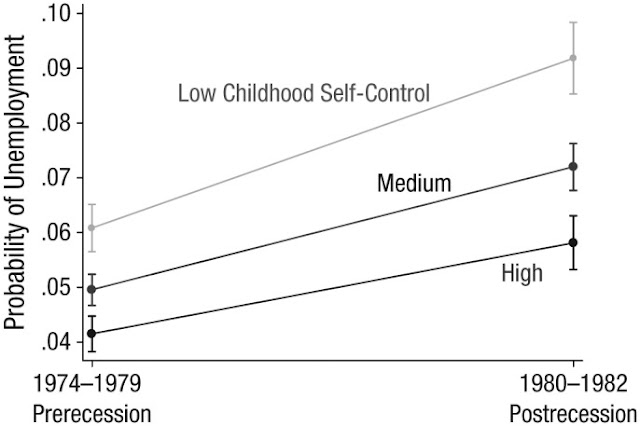Below: Descriptive unemployment statistics from Study 2 (National Child Development Study). Monthly data for August 1974 through October 1981 are shown for participants at three levels of childhood self-control (low = 1 SD below the mean or lower; high = 0.83 SD above the mean or higher; medium = all others).
Below: Results from Study 1: (a) predicted probability of unemployment at each assessment wave as a function of childhood self-control and (b) predicted marginal total number of months of unemployment as a function of childhood self-control. The error bars in (b) represent 95% confidence intervals. Low self-control = score 1 standard deviation below the mean; medium self-control = mean score; high self-control = score 1 standard deviation above the mean. Trends shown are adjusted for the inclusion of gender, intelligence, and social class in the regression equation.
Below: Results from Study 1: (a) predicted probability of unemployment at each assessment wave as a function of childhood self-control and (b) predicted marginal total number of months of unemployment as a function of childhood self-control. The error bars in (b) represent 95% confidence intervals. Low self-control = score 1 standard deviation below the mean; medium self-control = mean score; high self-control = score 1 standard deviation above the mean. Trends shown are adjusted for the inclusion of gender, intelligence, and social class in the regression equation.
Below: Results from Study 2 (National Child Development Study): predicted probability of unemployment before and after the 1980 recession, for participants at three levels of childhood self-control (low = 1 SD below the mean; medium = mean; high = 0.83 SD above the mean). Error bars represent 95% confidence intervals.
The capacity for self-control may underlie successful labor-force entry and job retention, particularly in times of economic uncertainty. Analyzing unemployment data from two nationally representative British cohorts (N = 16,780), we found that low self-control in childhood was associated with the emergence and persistence of unemployment across four decades. On average, a 1-SD increase in self-control was associated with a reduction in the probability of unemployment of 1.4 percentage points after adjustment for intelligence, social class, and gender. From labor-market entry to middle age, individuals with low self-control experienced 1.6 times as many months of unemployment as those with high self-control. Analysis of monthly unemployment data before and during the 1980s recession showed that individuals with low self-control experienced the greatest increases in unemployment during the recession. Our results underscore the critical role of self-control in shaping life-span trajectories of occupational success and in affecting how macroeconomic conditions affect unemployment levels in the population.
Read more at: http://ht.ly/RiKd2 HT https://twitter.com/StirUni




No comments:
Post a Comment